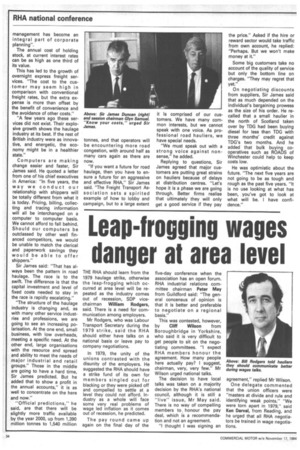Leap-frogging wages danger at area level
Page 36

If you've noticed an error in this article please click here to report it so we can fix it.
THE RHA should learn from the 1979 haulage strike, otherwise the leap-frogging which occurred at area level will be repeated as the industry comes out of recession, SDP vicechairman William Rodgers, said. There is a need for communication among employers.
Mr Rodgers, who was Labour Transport Secretary during the 1979 strike, said the RHA should either have talks on a national basis or leave pay to company negotiations.
In 1979, the unity of the unions contrasted with the disunity of the employers. He suggested the RHA should have a strike fund of its own for members singled out for blacking or they were picked off and compelled to settle at a level they could not afford. Industry as a whole will face some very real problems of wage led inflation as it comes out of recession, he predicted.
The pay round came up again on the final day of the five-day conference when the association has an open forum. RHA industrial relations committee chairman Peter May from Guildford said: "The general concensus of opinion is that it is better and preferable to negotiate on a regional basis."
This was contested, however,
by Cliff Wilson from Boroughbridge in Yorkshire, who said it is very difficult to get people to sit on the negotiating committees. "I expect RHA members honour the agreement. How many people here actually pay? I suggest, chairman, very, very few." Mr Wilson urged national talks.
The decision to have local talks was taken on a majority decision by the RHA's national council, although it is still a "live" issue, Mr May said. There is no way of compelling members to honour the pay deal, which is a recommendation and not an agreement.
"I thought I was signing an agreement," replied Mr Wilson.
One delegate commented that the union officers were "masters at divide and rule and identifying weak points." "We were torn apart in 1979," said Ken Darya!, from Reading, and he urged that all RHA negotiators be trained in wage negotiations.












































































































